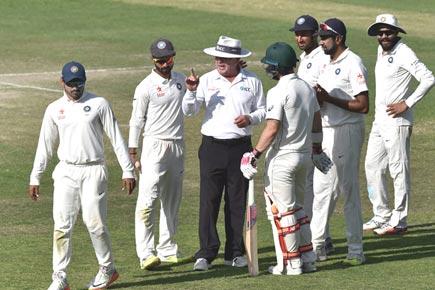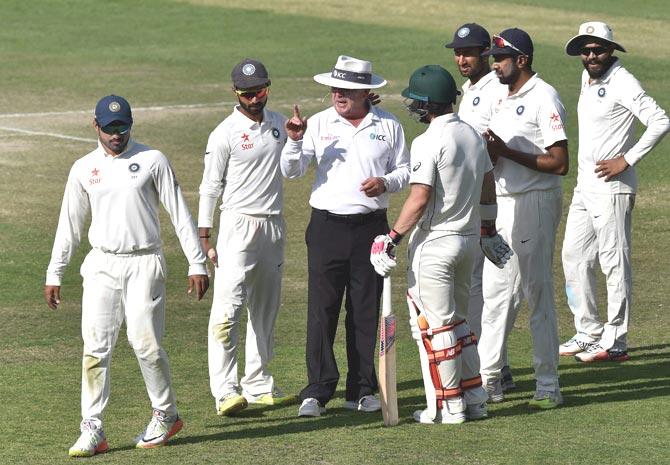Hate to say 'I told you so' but it was ever going to end thus...a gripping Test series that was allowed to spiral into an aftermath of bitterness and bad blood, writes Michael Jeh

 Umpire talking to India's K Nair after he argues with Australia's M Wade during the 3rd day of last test match. Pic/PTI
Umpire talking to India's K Nair after he argues with Australia's M Wade during the 3rd day of last test match. Pic/PTI
Hate to say "I told you so" but it was ever going to end thus...a gripping Test series that was allowed to spiral into an aftermath of bitterness and bad blood. In my most recent mid-may column (Hammer out this malaise, March 11), I warned of a poisonous atmosphere that was palpable, largely ignored by the match officials and justified in some quarters by giving immature men the benefit of the doubt when it comes to knowing where to draw an invisible line. Clearly, despite the rhetoric about IPL friendships and being inspired by the calming influence of the Dalai Lama, as the series reached an ugly climax in Dharamsala, players from both teams found themselves caught in a vortex of sledging that took the gloss off an otherwise enthralling contest.
This rubbish about "what happens on the field stays on the field" was never going to work, not with these two teams anyway. Too many egos, too many old scores to settle, too much water under the bridge, too many umpires and match referees unwilling to risk the wrath of the two most powerful Boards by doing their jobs properly. It will be interesting to see if these same officials give some of the lesser teams as much latitude with their behaviour as they did in this series. Even when they made token attempts to rein players in, the barbs continued. Clearly the players also understand the politics of convenience when it comes to being reported.
ICC should play its part
As I have said repeatedly, unless the ICC can come up with a more prescriptive line in the sand than leaving it up to the players to know where to draw the line, this blight on the game will never be erased. Australian cricketers especially love talking about this so-called unwritten rule about what happens on the field blah blah blah. The problem with unwritten rules is exactly that — a problem! There is no universal agreement on whether all participants will adhere to those rules. Who made up the rule? Who agreed to it? There's nothing in cricket rules which make reference to this alleged time-honoured mantra. It's like American foreign policy — you can't just make up a rule, bound in hypocrisy and expect every other nation to agree to it. Here are two examples: Virat Kohli mocking the Australians from the dressing room when they got a DRS decision wrong in Ranchi. He wasn't on the field at the time, so clearly that rule didn't apply to him. Steve Smith calling Murali Vijay a "f*****g cheat" from his dressing room in Dharamsala — another example of an incendiary moment that happened off the field. Going back a few years, Darren Lehmann calling the Sri Lankans "black c***s" when he was run out at the Gabba — that too happened off the field. So for all the talk of cricketers being mature enough to contain their abuse within the white line, it is clear that it remains a hollow catchcry with no integrity.
Speaking of integrity, Smith gets all hot under the collar when he accused Kohli of calling him a cheat after the Bangalore brain fade. Yet Kohli didn't actually ever say the word; it was Smith who ended up crossing that line by calling Vijay a cheat. Now that's irony! All that confected outrage about being called a cheat and then he actually uses the same word prefaced by an expletive. Border Gavaskar Trophy surrendered along with the moral high ground.
Is it personal?
Cricketers also love defending their on-field behaviour with motherhood statements like "so long as it's not personal". Another complete load of tripe. Of course, it's personal. Isn't that the whole point of effective sledging? Sure, it may no longer be racist or homo phobic but as I've argued before, what makes that so special as a "no go" zone? The transcript of Smith's sledging when he referred to Jadeja's poor overseas record and questioned whether he would be selected when India next play overseas was 100 per cent personal. It would have been utterly benign if it wasn't meant to be taken personally. Imagine if the Indian captain, the supposed leader of team culture said something along similar lines about David Warner's abysmal overseas record. Perhaps those sledges were delivered with venom earlier — India's behaviour throughout the series was nothing to be proud of.
 Subscribe today by clicking the link and stay updated with the latest news!" Click here!
Subscribe today by clicking the link and stay updated with the latest news!" Click here!







